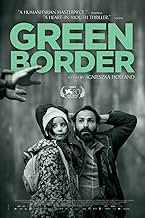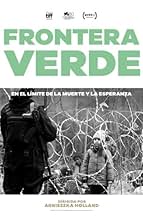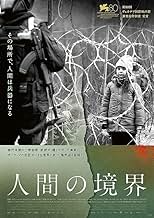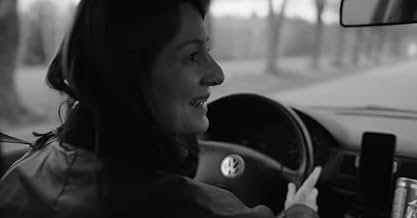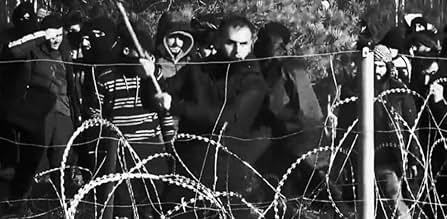CALIFICACIÓN DE IMDb
6.4/10
7.3 k
TU CALIFICACIÓN
Una familia de refugiados sirios, un profesor de inglés afgano y un guardia fronterizo se encuentran en la frontera polaco-bielorrusa durante la última crisis humanitaria en Bielorrusia.Una familia de refugiados sirios, un profesor de inglés afgano y un guardia fronterizo se encuentran en la frontera polaco-bielorrusa durante la última crisis humanitaria en Bielorrusia.Una familia de refugiados sirios, un profesor de inglés afgano y un guardia fronterizo se encuentran en la frontera polaco-bielorrusa durante la última crisis humanitaria en Bielorrusia.
- Dirección
- Guionistas
- Elenco
- Premios
- 30 premios ganados y 32 nominaciones en total
Behi Djanati Atai
- Leïla
- (as Behi Djanati Ataï)
Muhammad Al Rashi
- Grandpa
- (as Al Rashi Mohamad)
Michal Zielinski
- Sasza
- (as Michael Zielinski)
- Dirección
- Guionistas
- Todo el elenco y el equipo
- Producción, taquilla y más en IMDbPro
6.47.3K
Actividad inusual
Our rating mechanism has detected unusual voting activity on this title. To preserve the reliability of our rating system, an alternate weighting calculation has been applied.
Opiniones destacadas
At the begining i must say, i'm from Poland and i was very curious about this movie, as i was pretty familiar with volunteers stories, i had an opportunity to talk with few of them, a few medics and just regular people that wanted to help. Outside all the media coverage both private and national, i've read a lot of memories and interviews with people, both with volunteers' as well as the border guards and people living in the area. Some of them were really brutal, raw and just... sickening.
This movie is something i wanted to check out, to see if all the criticsm in (mostly far right) media was justified. And i'm really happy i checked it myself.
The cinema i was watching the movie in, was pretty much full, except for the first 3-4 rows, and the movie ended, everyone was just quiet. Like if everybody needed a minute to think. People only started talking in the main hall / outisde of the cinema.
In my opinion movie mixes some of the real events with a bit of fake scenarios, some scenes were probably a bit exaggerated, but on the other hand, seeing photos and videos that were recorded on the real border, i think it's a good move by the creators of the movie.
I believe that movies like "The Green Border" are highly needed in our society. Society that often listen to only just one side of the story, without even trying to hear what others have to say. That's what all the buzz surrounding this movie came from. Just a lot of people, that didn't even seen it, criticise it to gain something. Especially now, right before elections in Poland.
Putting politics aside... It's just a good movie. With a very good acting, pretty good cinematography and remarkable importance for everyone, who's not aware of the humanitarian crisis, happening to this day at Polish-Belarusian border.
To summarize... I think this movie is for everyone, who's not afraid of criticism of their beloved party, state services or his own morals. This movie may leave you with some heavy emotions, thoughts and it's deafinately not an easy movie to watch. But i trully belive, everybody should check it on his own, with open mind and being ready to hear and see uncomfortable truth.
This movie is something i wanted to check out, to see if all the criticsm in (mostly far right) media was justified. And i'm really happy i checked it myself.
The cinema i was watching the movie in, was pretty much full, except for the first 3-4 rows, and the movie ended, everyone was just quiet. Like if everybody needed a minute to think. People only started talking in the main hall / outisde of the cinema.
In my opinion movie mixes some of the real events with a bit of fake scenarios, some scenes were probably a bit exaggerated, but on the other hand, seeing photos and videos that were recorded on the real border, i think it's a good move by the creators of the movie.
I believe that movies like "The Green Border" are highly needed in our society. Society that often listen to only just one side of the story, without even trying to hear what others have to say. That's what all the buzz surrounding this movie came from. Just a lot of people, that didn't even seen it, criticise it to gain something. Especially now, right before elections in Poland.
Putting politics aside... It's just a good movie. With a very good acting, pretty good cinematography and remarkable importance for everyone, who's not aware of the humanitarian crisis, happening to this day at Polish-Belarusian border.
To summarize... I think this movie is for everyone, who's not afraid of criticism of their beloved party, state services or his own morals. This movie may leave you with some heavy emotions, thoughts and it's deafinately not an easy movie to watch. But i trully belive, everybody should check it on his own, with open mind and being ready to hear and see uncomfortable truth.
"Green border" shows immigration from a different perspective than is slowly becoming mainstream in Europe, being it Poland (the land in which the film is situated), Holland (in which the anti-immagration party PVV won the election of november 2023) or England (that want to send refugees to Rwanda).
The situation on the Eastern border of Poland is different in this respect that the Belarus of Lukashenko uses refugees as a weapon against the European Union (EU). They lure refugees to Belarus with the promise that the transit to the EU (i.e. Poland) is without any difficulty, which of course is not the case.
"Green border" is a documentary like film that shows the story from different perspectives. These perspectives are those of a Syrian family, Polish border guards and Polish activists.
The episodes about the Syrian family and the border guards are heavy stuf and the episode about the Polish activists is desperately needed to bring back some confidence in humanity.
The conservative Polish government was very angry about the movie and even called director Agnieszka Holland a Nazi. This is of course ridiculous. The anger was most probably directed against the episode about the Polish border guards, but even these episode is not totally negative as its shows that the border guard these episode is about has increasing psychological difficulties with the job he is doing (pushing back refugees to Belarus). The episode is indeed very critical about his superior, telling the border guards that the refugees are not human beings but bullets fired by Lukashenko.
One perspective that is missing is the Belarussian one. One can criticize the harsh behaviour of the Polish border guards but there can be no doubt abourt the fact that Belarus started using the refugees as pawns in a cynical political power struggle.
Also from Western Europe we have to be carefull with too much criticism. The push backs on land by the Polish border guards are illegal, but what about the push backs on sea by Frontex? Moreover, we have easy talk, not bordering on a cynical regime like that of Lukashenko.
Images say more than 1000 words and in this respect the film is in my opinion a must see for those who want to understand more about the immagration crisis. In the Netherlands I had the feeling that the film was in roulation very short. I had to hurry to visit the last performance and was accompanied by only one fellow visitor.
To conclude one point of critic. In the epilogue the film shows how welcome Ukrainian refugees were when in february 2022 their country was invaded by Russia, strongly suggesting that there is a racist element in which refugeest are being supported and which not. I would like to qualify this suggestion. In the first place the aggressor in the Ukranian war is also a threat to Poland, unlike the aggressors in the other conflicts generating refugees (such as Assad in Syria). In the second place has the loyalty with Ukraine cooled down considerably (not in words but in deeds) after two years of war.
The situation on the Eastern border of Poland is different in this respect that the Belarus of Lukashenko uses refugees as a weapon against the European Union (EU). They lure refugees to Belarus with the promise that the transit to the EU (i.e. Poland) is without any difficulty, which of course is not the case.
"Green border" is a documentary like film that shows the story from different perspectives. These perspectives are those of a Syrian family, Polish border guards and Polish activists.
The episodes about the Syrian family and the border guards are heavy stuf and the episode about the Polish activists is desperately needed to bring back some confidence in humanity.
The conservative Polish government was very angry about the movie and even called director Agnieszka Holland a Nazi. This is of course ridiculous. The anger was most probably directed against the episode about the Polish border guards, but even these episode is not totally negative as its shows that the border guard these episode is about has increasing psychological difficulties with the job he is doing (pushing back refugees to Belarus). The episode is indeed very critical about his superior, telling the border guards that the refugees are not human beings but bullets fired by Lukashenko.
One perspective that is missing is the Belarussian one. One can criticize the harsh behaviour of the Polish border guards but there can be no doubt abourt the fact that Belarus started using the refugees as pawns in a cynical political power struggle.
Also from Western Europe we have to be carefull with too much criticism. The push backs on land by the Polish border guards are illegal, but what about the push backs on sea by Frontex? Moreover, we have easy talk, not bordering on a cynical regime like that of Lukashenko.
Images say more than 1000 words and in this respect the film is in my opinion a must see for those who want to understand more about the immagration crisis. In the Netherlands I had the feeling that the film was in roulation very short. I had to hurry to visit the last performance and was accompanied by only one fellow visitor.
To conclude one point of critic. In the epilogue the film shows how welcome Ukrainian refugees were when in february 2022 their country was invaded by Russia, strongly suggesting that there is a racist element in which refugeest are being supported and which not. I would like to qualify this suggestion. In the first place the aggressor in the Ukranian war is also a threat to Poland, unlike the aggressors in the other conflicts generating refugees (such as Assad in Syria). In the second place has the loyalty with Ukraine cooled down considerably (not in words but in deeds) after two years of war.
This is the second film I've seen this week with Tomasz Wlosok. Earlier, he was in Julia von Heinz's tragic-comedy "Treasure" (2024) with a far lighter and fluffier role than he has here, as a Polish border guard. He is part of a team charged with repelling refugees trying to cross into the EU from Belarus. On that front, we are introduced to travellers who have been lulled into thinking their flight from Syria and Afghanistan will be a dawdle. An expensive one, yes, but a straightforward flight to Minsk on a comfortable Turkish aircraft then a bus to Poland thence on to wherever. Sadly, they soon realise that their bought-and-paid-for journey merely inserts them into a game of human table tennis between the military on both sides of a border - only it's coiled barbed wire rather than a net. It doesn't matter what their predicament - injured, pregnant, old, vulnerable - they are systematically robbed, starved and dehydrated. There is some hope for them, though, as Polish activists try to help them and get them on the register for asylum. That, however, requires that they be reported to the police and then to the guard and so we are back with handsome Tomasz ("Jan") again. Their journey is riddled with peril and that's harrowing at times, but somehow not quite so difficult to stomach as the behaviour of the people in uniform bending or breaking the rules from above to ensure a minimum of these people ever made it past the forests of the 250-odd miles of border. Politics plays it's part too - the government of one nation accused of using these people as "live bullets", the other of sowing seeds of dissent within an EU where rising nationalism is polarising societal attitudes. In the end, it is a really rather brutal assessment of human nature at it's worst whilst also illustrating just what lengths decent folks will go to, and the risks they will take, to do what they feel is right. The intensity of the camerawork - especially in the woods, and the audio editing give this an added piquancy that makes their plight all the more terrifying, frustrating and deadly. I didn't quite get the point of the anecdote at the end. I'm not sure that concluding assertion took into consideration the historic cultural and traditional links between neighbouring Poland and Ukraine as distinct from those fleeing from Syria, but it does offer us considerable food for thought on what is the right thing to do without imposing director Holland's personal view too overwhelmingly on the issues faced by countries that might be legitimately concerned about the impact on their nation, economy and culture of large scale migration. It's not an easy film to watch, it's violent and nasty - but compelling.
I loved the different perspectives this movie shown, at first tho i was scared that they would show all guards and people there as bad ones. It is not all black and white like that. There was some things that this movie omitted, but i think the message still is valid. We should all be treated in humanly way, you know. As a sensitive person this movie hit me hard, the pregnant woman scene, like WHO can be heartless like that. I am also big fan of french music, so i loved 'Mourir mille fois' in the soundtrack. Anyway, if u think about watching this movie, than i think its a great way of spending sad autumn afternoon. For sure you will think about this movie for a while. ( If you dont find feelings, emotions etc. Interesting than maybe dont go, cos you will not get the point and probably you'll be bored). Have a nice day people :)
Polish director Agnieszka Holland's impassioned examination of the European refugee crisis from her nation's perspective. Holland's film, which she also co-wrote, is a sprawling work which begins by following a family of Syrians who are trying to the EU through Russian dominated Belarus. From there, the movie weaves it way to the Border Guards and, eventually, ia small band of mostly female Aid workers who give medical and legal assistance to the immigrants.
The structure is a bit daunting even though there are loose connections binding it all together. Cinematographer Tomasz Naumiuk shoots in an austere Black and White with Frédéric Vercheval's brooding score as accompaniment. The large cast is quite good with Maja Ostarszewska a standout as the, perhaps a bit naive Julia, one of the Polish volunteers. Behi Djanati Atai is memorable as a defiant Afghan woman who crosses the border with the Syrians. What knits it together is Holland's vision, which becomes clearer and clearer as the various strands are brought together - while simulataneously being torn assunder.
Holland never flinches from the painful and graphic details of the refugees' plight. They are literal political footballs booted from one side of the border to the other. There are times when the structure doesn't completely work and the filmmaker does dwell a bit on some seemingly extraneous details, but, there is no questioning Holland's fervor - much of it directed at Poland's leadership. It's been a highly controversial film within the nation and its government, and throughout much of Europe.
Unsurprisingly, it was NOT Poland's official submission to this past year's Academy Awards.
At 75, Holland (an Oscar nominee for EUROPA EUROPA) has made a daring - some would say angry - film. A stunning work of art that demands to be seen.
The structure is a bit daunting even though there are loose connections binding it all together. Cinematographer Tomasz Naumiuk shoots in an austere Black and White with Frédéric Vercheval's brooding score as accompaniment. The large cast is quite good with Maja Ostarszewska a standout as the, perhaps a bit naive Julia, one of the Polish volunteers. Behi Djanati Atai is memorable as a defiant Afghan woman who crosses the border with the Syrians. What knits it together is Holland's vision, which becomes clearer and clearer as the various strands are brought together - while simulataneously being torn assunder.
Holland never flinches from the painful and graphic details of the refugees' plight. They are literal political footballs booted from one side of the border to the other. There are times when the structure doesn't completely work and the filmmaker does dwell a bit on some seemingly extraneous details, but, there is no questioning Holland's fervor - much of it directed at Poland's leadership. It's been a highly controversial film within the nation and its government, and throughout much of Europe.
Unsurprisingly, it was NOT Poland's official submission to this past year's Academy Awards.
At 75, Holland (an Oscar nominee for EUROPA EUROPA) has made a daring - some would say angry - film. A stunning work of art that demands to be seen.
¿Sabías que…?
- TriviaAt 00:11:12, a refugee checks their location using an OpenStreetMap-based map on a smartphone. The location shown is the Poland-Belarus border at 52.61281 23.74398.
Selecciones populares
Inicia sesión para calificar y agrega a la lista de videos para obtener recomendaciones personalizadas
- How long is Green Border?Con tecnología de Alexa
Detalles
- Fecha de lanzamiento
- Países de origen
- Idiomas
- También se conoce como
- Green Border
- Locaciones de filmación
- Productoras
- Ver más créditos de la compañía en IMDbPro
Taquilla
- Total en EE. UU. y Canadá
- USD 96,595
- Fin de semana de estreno en EE. UU. y Canadá
- USD 7,305
- 23 jun 2024
- Total a nivel mundial
- USD 4,240,827
- Tiempo de ejecución2 horas 32 minutos
- Color
Contribuir a esta página
Sugiere una edición o agrega el contenido que falta

Principales brechas de datos
What is the Canadian French language plot outline for La frontera verde (2023)?
Responda



